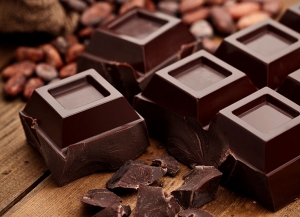Older adults can celebrate Valentine’s Day and American Heart Month by treating their senior sweetie to a heart-healthy treat: Dark chocolate.
More than just an indulgence, nutrients found in dark chocolate can support cardiovascular health, which is important for aging adults. But not just any ole’ dark chocolate; you want to indulge in dark chocolate with a high cacao content. What’s so special about cacao? Glad you asked!
Cacao: Raw Chocolate, Food of the Gods!
Considered by ancient Mayan culture to be the ‘food of the gods,’ cacao is cocoa (chocolate) in a raw, less-processed form. Cacao grows from trees called Theobroma cacao, which are native to South America and West Africa where more than half of the world’s cacao comes from. After harvesting, cacao is processed to make various chocolate products. The more cacao is processed, the more nutrients it loses. Less processing not only helps dark chocolate retain nutrient density, less additives are mixed-in, such as added sugars, palm oils, butters, and artificial flavoring.
To derive maximum health benefit from eating dark chocolate (in moderation) choose chocolate that contains 70-85% cacao (60% is the minimum cacao content).
What Makes High Cacao Dark Chocolate Good for You?
Like most plants, cacao contains nutrients and plant compounds (known as polyphenols) that support health. Dark chocolate, that is minimally processed, contains several health-promoting compounds. When cacao-rich dark chocolate is eaten in moderation as part of an otherwise healthy diet for older adults, it is associated with the following heart-healthy benefits:
- Antioxidants help to protect the health and integrity of cells and tissues by neutralizing free radical molecules in your body. (Free radicals are by-products of oxidative stress that occurs when your body is exposed to toxins.) Antioxidants are also associated with keeping inflammation at bay, which helps protect health and lower risk for chronic disease.
- Flavonoids/flavonols are plant compounds that promote heart health by fighting free radicals, supporting blood flow, and lowering blood pressure. In regard to cholesterol, some studies of overweight and obese persons show that dark chocolate reduces LDL particles in the blood vessels; LDL cholesterol is what clogs arteries and leads to heart disease.
- Magnesium, Potassium, and Zinc are minerals that support muscle tissue, heart function, and immunity. 1
Dark Chocolate as Part of an Older Adult’s Healthy Diet
Knowing that dark chocolate can support heart health isn’t a free pass to eat bars of it every day. When nutritionists and healthcare providers suggest eating dark chocolate, they are talking about an ounce or two a couple of times a week. They also intend for you to reduce your intake of overprocessed sweets and snacks and replace those with cacao-rich dark chocolate. In a nutshell, dark chocolate should a part of an older adult’s healthy diet inclusive of veggies, fruits, lean meats, poultry, and plenty of water.
Check out these 12 healthy versions of dark chocoalte recipes – our favorite: The Dark Chocolate Fondue.
This Valentine’s Day, surprise your sweetie by making cacao-rich dark chocolate fondue and sharing dipped fruit together. Remember to use chocolate ingredients that is 60% or higher in cacao content.
Fun Flavor Fact: Raw cacao has a unique flavor profile! Depending on the cacao content, dark chocolate can be slightly to very bitter compared to its more processed chocolate cousin. This is why many high-cacao dark chocolate products are infused with other nutrient-dense ingredients, such as dried fruit (raspberry, acai berry, blueberry) or fruit extract (orange, berry) or nuts (walnut, cashew). These ingredients cut the bitterness and enhance the sweet, tangy flavor profile of dark chocolate.



